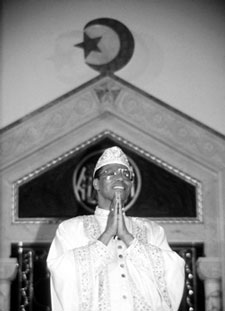JABRIL.MUHAMMAD
 “And your Lord says: ‘Pray to Me. I will answer you.”
“And your Lord says: ‘Pray to Me. I will answer you.”
This is in the Maulana Muhammad Ali translation of the Holy Qur-an, 40:60
***
My last article started with these words from the Holy Qur’an “Call to the way of thy Lord with wisdom and goodly exhortation, and argue with them in the best manner … (16:125) “ … argue not with the people of the Book except by what is best …” (29:46).
What is meant by these words: “and argue with them in the best manner” and “argue not with the People of the Book except by what is best … .”
What does the word “argue,” mean, in English, in these verses? After you see, what you see, how close is your view, feelings, and words, in your agreement, (concur; be in agreement; see eye to eye; be of the same mind; reach agreement 100%; correspond 100% of the very public statement, declaration) made by the Honorable Minister Louis Farrakhan, to America and to the world?
Can you state, in the public, if necessary, that you are with him, 100%, and back him up, in private or public?
Does the word “argue” here, in the Holy Qur’an, have to do with the words and the spirit, of the Honorable Minister Louis Farrakhan who has followed the words, in the sprit of his teacher, the Honorable Elijah Muhammad?
I’m ending this article, in this way. I will tell you why, Allah willing. Now, I’m obligated, 100%, to emphasize, what I’m about to write.

I wrote these few words, in my last article, to open a door about envy.
“The Honorable Minister Louis Farrakhan has brought the world–especially the United States of America–up to date, whose wisdom came from the Honorable Elijah Muhammad, who met and was taught, guided and empowered by the Supreme Being in person.
“Up to date means: ‘incorporating the latest developments and trends; incorporating or aware of the latest information; current.’
“Those who twist, distort or misrepresent the meaning of Minister Farrakhan’s words (the teachings) in private or in public, concerning this issue, cannot pass by the Supreme Being–Master Fard Muhammad and the Honorable Elijah Muhammad.”
Is envy, at least, a part of the many persons’ reactions to Minister Farrakhan’s private and public statements?
Why is this so important for me to make this statement clearly? Why I’m using the word “so,” in this sentence? The meaning of the word “so,” in the context, as I’m using, means: “as a result, therefore, hence, accordingly.”
Why is it so important for us to get out of envy, especially in time? What does that mean? Can we know what envy is, without knowing and destroying that, if that is in us? Can we do that, without knowing all we can know about it? Can we do that without deep prayer-NOW?
We first read of envy in the Bible in the history of Cain and Abel. Abel was divinely favored. Cain became envious of his brother. He came to hate his brother. Out of his envy and hate murdered his brother.
Abel did nothing to earn the envy of Cain. The envy of Cain sprang from his own heart. Cain’s envy gave birth to an unjust hatred of his brother. Abel’s death at the hands of his brother was totally unjustified. And Cain paid dearly for his wicked deed.
Joseph’s brothers were envious of him because God had favored him for His own wise purpose, for them. Korah was the same towards Moses. Saul tried several times to kill David, out of envy. And it is written in the Bible that the main motive involved in the betrayal of Jesus to his enemies, according to the Bible, was envy.
Envy can be seen as a major factor affecting the destinies of men and nations in both the scriptures and in the writings of many about this world for the past 6,000 years.
Envy has been, and is, a major factor shaping the history of America and the Black people in her midst. It has been, and still is, a major factor in the relations between Black brothers and sisters in this country. Therefore, envy has been an evil reality that the Honorable Elijah Muhammad and now, Minister Farrakhan, has had to deal with from the start of their missions.
What is envy? What are its roots? Why is it so destructive? It is often said that envy is self-destructive.
Why? How does envy differ from jealousy? How is envy and jealousy manifested?
Dictionaries are of little or no help in defining the state of mind and feelings that the word envy represents.
However, if you ever probe the study of morality you will find that the extent to which envy influences vital issues is avoided publicly by most writers, teachers, politicians, scholars in all fields, and so on.
Envy is sneaky. It wears many faces or disguises. Have you ever considered that it is all but impossible to depict a person posing by him or her self, in a picture in a manner that tells any viewer that the person is envious? If you were to draw an envious person, how would that person look?
Why is it so hard? The reason is due to the fact that envy in a person cannot be detected apart from that person’s relation to the one he (or she) envies.
Envy is an emotion that is directed towards another. Without the other, (a target, a victim) envy cannot happen.
You can show fear, happiness, anger or grief, for example, far more easily than you can see or show envy, in such as pictures, sculpture, etc.
It is not easy to portray the state of mind of a person who despises another for having a reputation, or for having some skill that the envier not only lacks (to some degree) but also would rejoice at the other’s loss of such assets; though that loss would not mean a gain for the envier.
It should be clear that envy is a complex thing. Complex, though it is, it can be understood.
Let us take our time and take a good look at this thing found in the human heart, called envy. As we do, remember it is part of evil in general, which was permitted by Allah.
He permits that for His own perfect reason. This is not to say that envy is good in itself. But this is to say that there is some good purpose in Allah Himself, that envy serves, as it is part of the whole of evil permitted by Allah.
This tells us that we must take a good look as we ponder at this thing called envy. A good look, in this sense, is a look corresponding to God’s way of looking; since evil in general and envy in particular could not exist but by Allah’s permission.
Envy becomes possible when two people become capable of mutual comparison. It is how one compares his (or her) self to the other that determines whether or not envy occurs.
Again, envy is a drive or an urge to compare oneself invidiously with another. To compare oneself invidiously is to compare oneself to another in an unlikable, alien, hostile producing way. It is an envy producing comparison. Invidious once had the meaning of envy.
The envier sees the possessions of others; both material and immaterial. The envier would like to see the one he (or she) envies dispossessed or deprived of his or her possessions. Moreover, the envier would also like to see the envied humiliated and/or hurt for having had those possessions.
Yet the envier wants no envy in return.
More next issue, Allah Willing.












